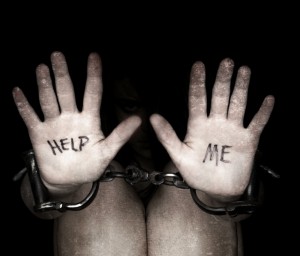HUMAN TRAFFICKING — MODERN-DAY SLAVERY
 As members of the New Jersey Coalition Against Human Trafficking, NCJW Bergen County Section was invited to attend the Amicus Brief (Friend of the Court) hearing at the Federal Courthouse in Newark on Friday, August 9. As members of the New Jersey Coalition Against Human Trafficking, NCJW Bergen County Section was invited to attend the Amicus Brief (Friend of the Court) hearing at the Federal Courthouse in Newark on Friday, August 9.
NJ Assemblywoman (and NCJW Life Member) Valerie Huttle’s NJ Human Trafficking Prevention, Protection and Treatment Act was signed into law by Governor Chris Christie in May. It was slated to go into effect the first week of August as part of the crackdown on human trafficking prior to the Super Bowl Game in February 2014.
On June 28 U.S. District Court Judge Dennis Cavanaugh temporarily blocked a portion of NJ’s Anti-Trafficking law because Backpage, a web company, sued the State of NJ, claiming that the law violates the long-standing Communications Decency Act.
Fearing a proliferation of pornography, the Communications Decency Act was passed by Congress in 1996 to criminalize making obscene material available to people younger than 18. Not wanting to limit the growth of the web, lawmakers made a major concession to online companies: immunity from being held liable for the material people post on line. They would not be held responsible for any illegal content posted by independent people who visit their sites.
Backpage is an online bulletin board where anyone can post ads for free for many services such as selling a book, a sofa or even renting out a room. But Backpage also has an adult services section which is its money-making enterprise. Placing ads for massages, escort services and the like in the adult services section earns Backpage millions of dollars each year. A coalition of State Attorneys General has asked that Backpage close its adult services section because it is used to traffic individuals. Backpage refused to comply although Craig’s List, also an online bulletin board, was asked to close their adult services section and did so – a year ago.
The section of the law in question in NJ makes it a first degree crime to knowingly publish, disseminate or display an advertisement and any photographs promoting sex with a minor. When the NJ legislation was drafted originally, there was some expectation on the part of legislators that a lawsuit from Backpage might occur because they had already successfully challenged anti-trafficking legislation in Tennessee, Washington State and Missouri – and won.
A spokesman for Governor Christie said that they were not concerned about the law being challenged but rather how children could be protected from dangerous predators.
During the oral arguments at the hearing, Judge Cavanaugh recognized, understood and lauded the motives behind the law and that he was appalled by the specter of child exploitation. He went on to say that those motives did not outweigh the fact that the NJ law conflicts with the federal law (the Communications Decency Act). He stated “It’s not my job to write the laws; I have to interpret them.” While we were defeated in the U.S. District Court, Assemblywoman Huttle has indicated that they would appeal or possibly reword a part of the bill.
NCJW Bergen County Section will explore this subject in depth with a panel of experts at its General Meeting on Tuesday, November 19 at 12:30 p.m. at Temple Emeth. The public is invited to attend.
Bea Podorefsky, Chair of Human Trafficking Committee
September 3, 2013
| 

